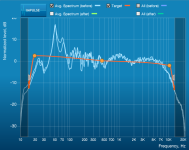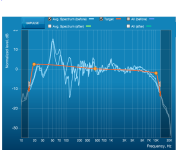I read that room correction programs installed in HIFI amps and AV processors can do wonders to set ups? Dirac, Audyssey, Room perfect, Arc etc
Anybody use them?
Are they correcting the room or the speakers? Or are both the same really?
They measure the output and then put filters to get a preferred frequency curve and then you can adjust to your liking, I suppose it's EQ with the added bonus of altering phase, levels etc
Anybody use them?
Are they correcting the room or the speakers? Or are both the same really?
They measure the output and then put filters to get a preferred frequency curve and then you can adjust to your liking, I suppose it's EQ with the added bonus of altering phase, levels etc
Last edited by a moderator:




